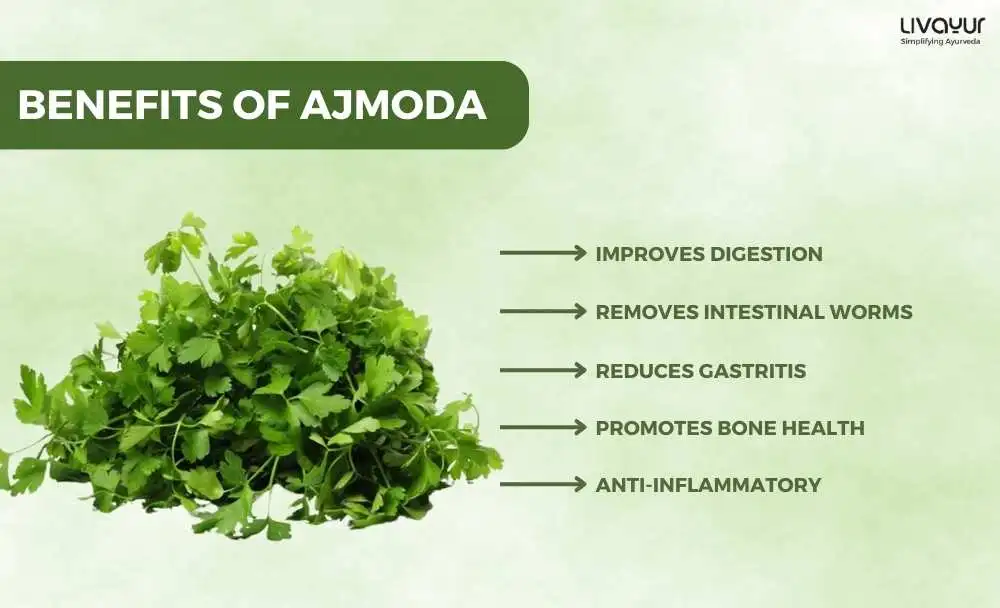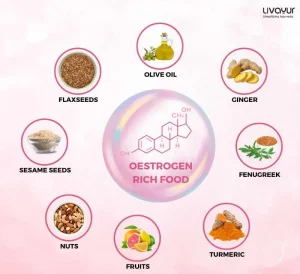
Ajmoda, also known as celery seeds, is an Ayurvedic herb and culinary spice that helps to boost digestive strength. It is scientifically termed Apium graveolens and offers many health benefits to the body. Ajmoda is rich in many nutrients such as proteins, dietary fibers, calcium, zinc, manganese, phosphorus, iron, magnesium, etc., and is vastly used in the treatment of diseases of the digestive system, respiratory system, urinary bladder, and circulatory system.
Different names of Ajmoda [1]
Ajmoda is also known as ajwain in Hindi and carom seeds in English.
Other names of Ajmoda, in different languages and regions, are:
| Name | Language | State / Region |
| Ajamoda, Ayamoda, Ajmoja, and Dipyaka | Sanskrit | Uttarakhand |
| Ajmuda, Ajmoda | Hindi | India |
| Oma, Ajavana, and Omakki | Kannada | Karnataka |
| Randhuni, Banyamani | Bengali | West Bengal |
| Omam | Malayalam, Tamil | Kerala, Lakshadweep and Puducherry, Tamilnadu |
| Naranjivamu | Telugu | Puducherry |
| Oova, Ajmoda | Marathi | Maharashtra |
| Banajuani | Oriya | Eastern India |
| Bodiajamo, Ajamo | Gujarati | Gujarat |
| Fakhazur, Banjuan | Kashmiri | Kashmir |
| Valjawain, Ajmod | Punjabi | North India |
| Ajmod | Urdu | North India |
| Bonjamani, Yamani, Ajowan | Assamese | Assam, Nagaland and Arunachal Pradesh |
What are the ayurvedic properties of Ajmoda?
According to Ayurveda, Ajmoda has:
- Katu (pungent) and Tikta (bitter) taste.
- Laghu (light), Rooksha (dry) and Teekshna (penetrating) qualities.
- Ushna Virya (hot potency).
Ajmoda is known to pacify Vata and Kapha Dosha. It can also increase Pitta Dosha in the body.
Medicinal properties of Ajmoda [1]
The medicinal properties of Ajmoda are as follows:
- Hepatoprotective: It is effective in mitigating liver damage.
- Anti-diabetic: Aqueous extract of celery seeds stimulates the pancreas to secrete more insulin.
- Anti-inflammatory and analgesic effects: It can help with pain and inflammation.
- Diuretic: It is a strong diuretic, and is used as a urinary antiseptic.
- Anti-hysteric: It is helpful in cases of anxiety and hysteria.
- Anti-cancer: Celery seeds have anti-cancer properties due to anti-cancer chemicals like polyacetylens and phthalide. These can detoxify the carcinogens present in cigarettes.
- Anti-microbial: The ethanolic extract of celery is anti-microbial.
Nutritional value of Ajmoda [2]
Per 2 g of Ajmoda, this is the nutritional value:
| Ingredients | Value present |
| Water | 0.121 g |
| Energy | 7.84 KCal |
| Protein | 0.362 g |
| Fat | 0.506 g |
| Ash | 0.185 g |
| Carbohydrate | 0.828 g |
| Total Dietary Fiber | 0.236 g |
| Calcium | 35.4 mg |
| Iron | 0.898 mg |
| Magnesium | 8.8 mg |
| Potassium | 28 mg |
| Sodium | 3.2 mg |
| Vit C | 0.342 mg |
| Phosphorous | 10.9 mg |
| Zinc | 0.139 mg |
| Copper | 0.027 mg |
| Manganese | 0.151 mg |
| Riboflavin | 0.006 mg |
| Thiamine | 0.007 mg |
| Niacin | 0.061 mg |
| Vitamin B & Folate | 0.018 mg & 0.2 µg |
How Does Ajmoda Help in Relieving Abdominal Pain?
Abdominal pain is called Shula in Ayurveda. Ayurvedic texts mention Ajmoda as an effective remedy for relieving Shula.
1. Improves Digestion:
Ajmoda is said to be a Deepana and Pachak herb, meaning that it helps to improve appetite and strengthen the digestive system. By boosting digestion, it helps to prevent gastrointestinal diseases that can cause abdominal pain.
2. Removes Intestinal Worms:
Another cause of abdominal pain is worm infestation in the intestines. Ayurveda mentions Ajmoda as an effective herb in treating Krumi or intestinal worms, thereby preventing and curing abdominal pain.
3. Reduces Gastritis:
Gas and bloating are known to be prevalent causes of abdominal pain. According to Ayurveda, Ajmoda is highly effective in treating Adhmana or gaseous distension in the abdomen, thereby also aiding in the treatment of abdominal pain.
What are the Other Benefits of Ajmoda?
- Ajmoda is highly beneficial in the treatment of asthma, cough, cold, bronchitis, and congestion.
- It is known to exhibit analgesic and anti-inflammatory properties that can help treat arthritis, rheumatism, gout, and joint pain.
- Ayurveda also mentions the use of Ajmoda in treating urinary bladder pain or Bastiruja.
- Ajmoda is rich in calcium, magnesium, manganese, and phosphorus which help to promote bone health and reduce the risk of osteoporosis.
- It is also highly effective in regulating blood pressure levels and boosting heart health.
- Ajmoda helps to balance Prana, Udana, Samana, and Apana Vayu, which aid in maintaining balance in the nervous system.
- It also helps to relieve menstrual cramps.
- Ayurveda also mentions the use of Ajmoda in the detoxification of the body.
How to use Ajmoda?
According to Ayurveda, Ajmoda water is highly beneficial in alleviating abdominal pain. To make Ajmoda water, you have to mix 1 part of Ajmoda powder with four parts of hot water. Leave it for 10 minutes and then filter it. You can take 3 ml of this water 3-4 times a day.
You may also include Ajmoda seeds in your diet. It is flavourful and aromatic and can be used to season soups, salads, pickles, etc.
Side effects and Precautions
Ajmoda does not have any severe side effects if taken in moderate quantities. However, it is advisable to consult an Ayurvedic doctor before using the herb for medicinal purposes. In addition, it is recommended that pregnant women and people suffering from kidney inflammation, low blood sugar levels and an allergy to Ajmoda seeds should not use this herb.
Takeaway
Ajmoda is one of the best herbs that you can consume to alleviate abdominal pain. It is highly effective in boosting digestion and treating gastrointestinal disorders such as gas, bloating, intestinal worms, etc., which are the leading causes of abdominal pain.
FAQs
1. What is Ajmoda called in English?
Ajmoda is called carom seeds and celery seeds in English.
2. What is the potency of Ajmoda, as per Ayurveda?
Ajmoda has hot potency, as per Ayurveda. It has ushna virya.
3. Can Ajmoda help in relieving abdominal pain?
Yes, Ajmoda can help in relieving abdominal pain – by improving digestion, removing intestinal worms, and reducing gastritis.






















2 Comments